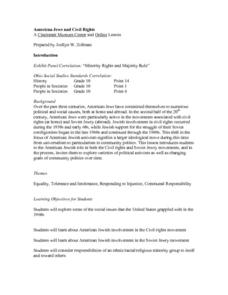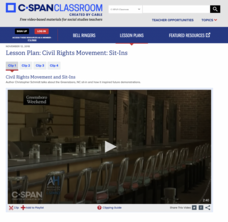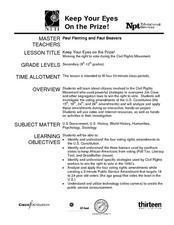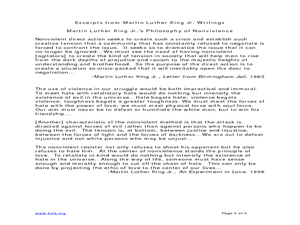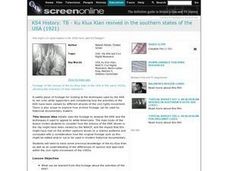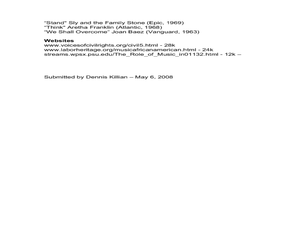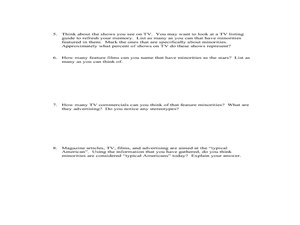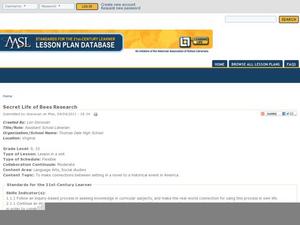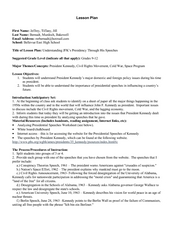Stanford University
Civil Rights or Human Rights?
Young citizens consider the American civil rights movement as part of the global struggle for human rights. After using a timeline activity to learn about the major events in the civil rights movement, class members study Malcolm X's...
National Endowment for the Humanities
The Freedom Riders and the Popular Music of the Civil Rights Movement
The Civil Rights Movement of the 1960s marched to its own beat—literally. Using songs from the era, as well as other primary sources such as King's "I Have a Dream" speech, class members analyze lyrics to discover how music and protest...
PBS
Making Change: Revolutionary Tactics of the Civil Rights Movement
The film American Revolutionary: The Evolution of Grace Lee Boggs introduces viewers to the differing philosophies of and strategies employed by 1960s civil rights leaders such as Malcolm X and Martin Luther King, Jr. and the debate over...
Curated OER
American Jews and Civil Rights
Tenth graders examine the Civil Rights movement of the 1960's and how American Jews were involved. They discuss the responsibilities of any minority or ethnic group. They consider the process of change in politics as well.
Curated OER
Civil Rights Time Line
Learners create a time line about important events in the civil rights movement of the 1950s and 1960s.
C-SPAN
Civil Rights Movement: Sit-Ins
Part of the protests of the Civil Rights Movement were small scale sit-ins at lunch counters. This form of on-the-ground activism is the focus of a C-SPAN resource that includes four video-clips about the sit-ins by pupils at a lunch...
Newseum
'The Press and the Civil Rights Movement' Video Lesson
Scholars watch a video featuring journalists who covered the civil rights movement, then respond to questions on a viewing guide. The video features interviews with participants and original news footage from the 1950s and 1960s. In...
Curated OER
Human Rights And Civil Rights
While he may not be as well known as civil rights activists such as Mahatma Gandhi, Dr. Martin Luther King, or Malcolm X, Ralph Bunche's contributions certainly made him a leader in the struggle for civil rights in the United States and...
Curated OER
Keep Your Eye On the Prize
High schoolers learn about citizens who were actively involved in the civil rights movement, and the strategies they used to overcome the Jim Crow laws that were so prevalent in the 1960s. They investigate the voting amendments of the US...
National Endowment for the Humanities
Martin Luther King, Jr. and Nonviolent Resistance
Was nonviolent resistance the best means of securing civil rights for black Americans in the 1960s? In this highly engaging and informative lesson, your young historians will closely analyze several key documents from the civil rights...
Curated OER
African Americans in California’s Heartland – The Civil Rights Era
Events related to the Civil Rights Movement in Sacramento, California during the 1960s offer class members an opportunity to compare the nonviolent resistance approach favored by Dr. Martin Luther King and the NAACP with those of the...
Curated OER
USA: the KKK and Civil Rights Movement
High schoolers view film footage of the Ku Klux Klan in the U.S. in the early 1920s and examine how the actions of the KKK have been viewed by different strands of the civil rights movement. They watch the film and answer discussion...
Newseum
Civil Rights News Coverage: Looking Back at Bias
Not all southern newspapers covered the civil rights movement of the 1950s and 1960s. Young journalists investigate how The Lexington (Ky. Herald-Leader and The Jackson (Tenn.) Sun re-examined their coverage of the movement. After...
US House of Representatives
Hispanic-American Members of Congress in the Civil Rights Era, 1945–1977
New ReviewDebates around immigration in the news are not new, but they are a defining feature of the Hispanic American experience throughout the twentieth century. Looking through the lens of Hispanic Americans in Congress, class members explore...
Center for Civic Education
Citizenship Schools and Civic Education During the Civil Rights Movement and in the Present
Your young historians will discover the importance that citizenship education has played in the social progress of the United States as they learn about early efforts to discourage African Americans from voting in the 1960s.
Curated OER
Understanding the Music of the Civil Rights Movement
Students examine protest music and songs from the Civil Rights movement. In this music of the Civil Rights era instructional activity, students listen to selected music before working in groups to determine who the music was directed at,...
Curated OER
The Civil Rights Movement
Students analyze the tensions that existed in American society during the Civil Rights Era as well as the problems that children experienced. They evaluate editorial cartoons dealing with the American Civil Rights movement to view the...
Stanford University
Lesson Plan: The Children's Crusade and the Role of Youth in the African American Freedom Struggle
Young people played significant roles in the Civil Rights movement. Class members examine the contributions of Barbara Johns, Claudette Colvin, Mary Louise Smith, and the children of Birmingham,...
Stanford University
Civil Rights Act of 1964
Was JFK a fallen Civil Rights hero—or a fraud? Learners examine Kennedy's own words and those of his critics to decide for themselves. After examining Kennedy's actions before his assassination, they determine what sort of legacy he left...
Curated OER
Minorities in Mainstream American Society
So many people fought for Civil Rights in the United States. Read about the Civil Rights Act of 1964, and discuss what the act guarantees. Then pass out a slew of magazines and encourage them to observe how often minorities appear in...
Curated OER
Secret Life of Bees Research
The Secret Life of Bees provides high schoolers an opportunity to connect the events in the novel to events in America’s history. After choosing a topic from a provided list, individuals research how the event affected the Civil Rights...
National Endowment for the Humanities
"Sí, se puede!": Chávez, Huerta, and the UFW
"Sí, se puede!" Cesar Chavez and Dolores Huerta believed organizing farm workers and changing their working conditions were possible. Scholars examine provisions of the Bracero Program, videos, and the United Farm Workers' (UFW) work....
Curated OER
Understanding JFK's Presidency through his Speeches
Students reflect and discuss the major events that happened in the United States in the 1950's and 1960's. In this U.S. History lesson, students read and analyze the famous speeches during this time frame, then complete a worksheet that...
Curated OER
New Voices for African Americans
Eleventh graders study Malcolm X and black power. In this African American lesson, 11th graders write a journal entry about black power and create a timeline of the events during the civil right movement.





